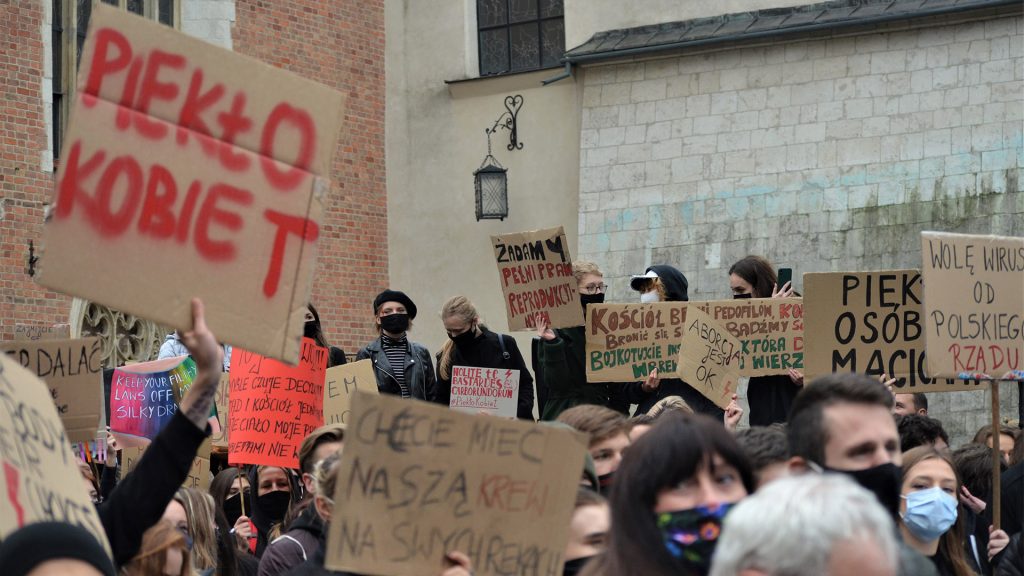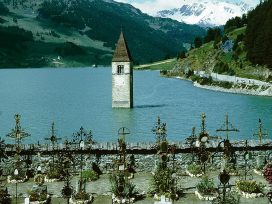On 22 October 2020, the Constitutional Tribunal of Poland ruled abortion on the grounds of foetal abnormality to be unconstitutional. This effectively eliminated the possibility for legal abortion. Of the 1110 pregnancies legally terminated in Poland in 2019, a very small number in any case, 97% were because of foetal abnormalities. Should the ruling take effect, it would mean that abortion will only be permitted if a pregnancy is a result of a crime (such as rape or incest), or if it poses a danger to the pregnant woman’s life or health. The doctors and other people soliciting or assisting the termination of a pregnancy for foetal abnormalities would be criminally liable.
The judgment has sent over 400,000 people onto the streets across the country and may have been the proverbial straw that breaks the camel’s back of popular discontent in Poland.
Poland’s Constitutional Tribunal could not be accused of undermining the role of the executive. The majority of its judges have been nominated by Law and Justice and any divergence from the political line of the governing party, no matter how slight, comes as a surprise. Irregularities in the nomination and election of some of the judges, including the President of the Tribunal, have been the subject of incessant controversy ever since 2016.
The abortion ruling was issued following a motion submitted in December 2019, shortly after parliamentary elections, by a group of 119 conservative and nationalist MPs, the majority of whom were members of Law and Justice. In filing the motion, Law and Justice acted on its long-standing commitment to its traditionalist rightwing Catholic electorate. With as much as 90% of the population being Catholic, this commitment has been one of the major political resources of Law and Justice.
The symmetrical political engagement of the Church is strongly criticized by moderate and progressive Catholic circles. It might be true that in the long run it will cost the Church support, especially among the youngest generations. However, the short-term benefits – both financial and in terms of prestige – seem to prevail.
Even before 1989, the Church had sent strong pro-life messages. Since the 1950s, abortion was legal not only on medical grounds or in the case of rape or incest, but also on the grounds of the ‘difficult living conditions’ of the pregnant woman. Catholic activists had tried and failed to have this regulation overturned. In 1993, the abortion law was adopted that remains in force today. Commonly referred to as the ‘abortion compromise’, it stipulates that pregnancy cannot be terminated for social reasons. The compromise was far from satisfactory for anyone, but there was no political momentum sufficient to change it in either direction, despite massive pro-life initiatives.
An attempt to liberalize the abortion laws under the post-communist leftwing government was almost successful. An amendment passed in 1996 allowed for abortion for social reasons or due to a difficult personal situation. A motion for a constitutional review was immediately filed and the amendment was overturned by the Constitutional Tribunal in 1997, just before the Constitution of Poland entered into force. The motion to include the protection of human life from the moment of conception into the catalogue of constitutional values failed and the abortion law returned to the status quo of 1993.
It had stayed this way for 27 years, surviving a succession of socialist, centrist-liberal and national-conservative governments. Amendments were proposed both by pro-life and pro-choice forces, including civil society organizations and social movements, but none of them managed to organize a parliamentary majority. Throughout this time, debate around abortion in Poland has been heated. Legal abortion was far from easily available, with long procedures and doctors using the conscience clause too feely. On three occasions, Poland has been found guilty by the European Court of Human Rights of failing to secure access to prenatal diagnostics and legal abortion. However, it has never followed the Court’s recommendations regarding the realization of the human rights of pregnant women.
When Law and Justice returned to power in 2015, abortion predictably returned to the agenda. The Catholic media pressed Law and Justice to live up to its ideological declarations. In 2016, a group of citizens submitted a draft law to delegalize abortion altogether. Its reading in the parliamentary commissions caused a wave of demonstrations and strikes, which were referred to as the ‘Black protest’. Across the country, tens of thousands of women (though precious few men) demonstrated against the amendment of the abortion laws. Law and Justice dropped the bill and the protesters went home.
An easy target: LGBT+
It seemed that the Black protests had scared Law and Justice off the problem of abortion for a while. Before the parliamentary election of 2019, the party artfully downplayed the issue to avoid the toxic label of religious radicalism. Instead, LGBT+ provided Law and Justice with an opportunity to prove its Catholic credentials. Since March 2019, over 90 local authorities (from small rural communities to five out of 16 voivodeships) have adopted resolutions that either declared them ‘free from LGBT ideology’ or expressed their support for rights of the family designed to exclude LGBT+ people. The anti-LGBT+ campaign has been supported by the highest-ranking state officials and by the leadership of the Law and Justice. A wave of demonstrations by the supporters of LGBT+ rights culminated in Summer 2019. Protesters hung rainbow banners on Church fences and religious monuments and clashed with the police.
The crusade against ‘LGBT-ideology’ tarnished Poland’s image abroad yet further. At the end of 2019, the European Parliament voted to condemn Poland’s ‘LGBT-free zones’ and in Summer 2020 the European Union has denied structural funding to the respective municipalities. However, the international outcry did nothing to harm Law and Justice’s chances in the elections of October 2019. In its manifesto, the party strongly stated its commitment to the heteronormative definition of the family. Abortion, on the other hand, barely featured in the election campaign.
No wonder. A survey conducted between 1992 and 2016 by the Public Opinion Research Centre in Warsaw showed that while support for abortion ‘on demand’ has sunk from 27% to 14%, support for abortion because of a crime or danger to the woman’s life has never dropped below 77%. When it comes to abortion because of foetal abnormalities, support dropped from 71% in 1992 to 60% in 2016. In 2016, 62% of Poles were against any changes in the abortion laws, and only 7% were in favour of more restrictions. Surveys conducted by other institutions after 2016 have documented, on the one hand, increasing support for the liberalization and, on the other, increasing polarization of opinion on abortion. Differences between opinion polls notwithstanding, it was evident that a large majority of Poles did not wish a more restrictive abortion law.
Why now?
The motion for constitutional review had first been submitted in 2017 but, after failing to reach the court, had been discontinued after the end of the parliamentary term in 2019. In other words, the motion re-submitted in 2019 had already spent a long time on the shelf. This makes it hard to believe that some higher legal imperative forced it onto the Tribunal’s agenda at that very moment.
The judgment was bound to trigger massive protests, for a number of reasons. The systematic dismantling of the rule of law in Poland since 2015 is one factor: Law and Justice is in an ongoing dispute with the EU-Commission under the EU Rule of law framework and has been castigated many a time by the EU-Parliament. The Court of Justice of the European Union ruled against the Law and Justice reforms in 2018. And at home, the Polish government is in permanent conflict with a large part of the judiciary and the legal profession. The public image of the Constitutional Tribunal has also suffered greatly. This undermines any decision it makes, including the abortion ruling. This loss of legitimacy is compounded by the purely legal criticisms of the ruling raised in two dissenting opinions and later by a range of experts, as well as misgivings regarding the legality of the judgment.
It is safe to assume that 400,000 people would not be risking their health demonstrating against a judgment whose legality is beyond any doubt, issued by a respectable institution of unquestioned independence. But the intensity of the protests can also be explained by the growing antagonism between radical Catholic and radical anti-Catholic circles, especially after many cases of child abuse in the Polish Church were reported in 2019. The anti-LGBT campaign of 2019 has shown a society torn in two, with very few bridges in sight. On these issues as well as on the question of rule law, the public has become divided into two parts, each fed by the politically engaged media, including the politically controlled public broadcasters.
And then came the pandemic
Compared to most EU-countries, Poland was not hit badly by the first wave of COVID-19 in early spring 2020. It seemed that both the population and the economy would manage to stay afloat, despite the infections and the severe lockdown. The presidential election scheduled for May 2020 finally took place in June and July 2020. The Law and Justice candidate, Andrzej Duda, won in the run-off ballot against the president of Warsaw, Rafał Trzaskowski. The difference between the two candidates was minimal (a little over 400,000 votes). The turnout was the highest since 1995, which reflects the mobilization on both sides of the polarized political spectrum.
Now, the pandemic is again on the wing in Poland. The number of infections is rising at an alarming rate, with 415,000 cases and 6,102 deaths confirmed thus far. October 2020 witnessed a sharp spike in the COVID-19 curve. Testing capacities are almost exhausted, the healthcare system is overloaded, and access to healthcare for people with other conditions then COVID-19 is becoming precarious. In October 2020, influenza vaccines ran out. Despite all of this, the highest officials of state, including the president himself, have expressed scepticism about safety measures such as face masks. The level of compliance of the general population is also far from satisfactory. Angry voices from the branches of economy that suffer the most during the pandemic, including tourism, gastronomy, entertainment and transport, are making themselves audible, next to those of the radical right protesting against the restrictions.
An additional factor, whose real impact it is hard to judge, was the Law and Justice legislative initiative in September 2020, commonly referred to as the ‘Five for Animals’. The party proposed legislation that significantly improved the standards of protection of animal rights in livestock farming and the meat industry and included a transitional regime aimed at a full prohibition of fur farming. The act was reluctantly praised by the more leftwing media, but caused outrage amongst farmers, an important constituency for Law and Justice. It also led to an unexpected rebellion within Law and Justice, as well as to discord within the United Right alliance, whose MPs on this occasion turned out to be less disciplined than usual. A day after the lower chamber adopted the Five for Animals, the Constitutional Tribunal announced that in a month it would decide upon the motion for constitutional review of the abortion law, which had been shelved for nine months (or for three years, counting from the original submission).
When the ruling of the Constitutional Tribunal was announced after weeks of anxious anticipation, the triumphal reactions of rightwing politicians and the Catholic clergy mobilized not only the usual protesters but also many who would normally gravitate towards inaction. The result has been an unlikely alliance between often very young women (and more men than in 2016), people who have been protesting in defence of the rule of law since 2015, and LGBT+ people, together with farmers, restaurant and hotel owners, employees and many others. Despite the pandemic-restrictions, Poland has witnessed the biggest wave of demonstrations since 1989. Women’s organizations have described the situation as a ‘war’, and for many it was a shock to see women shouting profanities in public and waving banners reading ‘Get the F*** Out of Here’ – the kind of behaviour usually reserved for football hooligans. The National Women’s Strike was called on 29 October.
Many professional and academic organizations and institutions published statements calling on the government to de-escalate the conflict. Concern was also expressed in an unprecedented letter of more than 200 retired generals of the uniformed services, including the police force and the army, after the latter were deployed to police the demonstrations. Some protesters have also chosen to demonstrate in front of churches and even during Catholic masses. A number of Church buildings were damaged, which many Catholics reacted to with indignation. On 27 October, in a speech broadcasted on the internet, Kaczyński called upon Poles to ‘defend Polish churches’ against forces that would otherwise ‘destroy Poland’. Nationalist and extremist groups rose to the task, and threats and acts of violence were reported on both sides.
What next?
Apart from the COVID infection rates, the state of the economy, and the resilience of the healthcare system, there are two variables that will shape developments: the endurance of the protesters and the de-escalation strategy of Law and Justice.
The ruling of the Constitutional Tribunal has mobilized a huge number of people to stand up for their rights. But these rights are very different. There have been incidents that would almost be comical but for their grave context: people who came to defend the rights of women and were appalled to find themselves were walking arm in arm with homosexual men wrapped in rainbow flags. Young leftists would not necessarily welcome a tactical alliance with farmers, and many women who oppose the de facto outlawing of abortion do not support abortion on demand, which is what the Women’s Strike activists demand. It is a fragile coalition bound by diverse grievances. Whether it can act as a counterweight to national conservatives and make a difference in institutional politics remains to be seen.
What is more predictable is that the protests will fuel the incipient conflict on the right. Abortion is no less sensitive a subject within the governing party as it is in the nation as a whole. For the time being, the ruling of the Tribunal remains unpublished, which means that it cannot take effect. The termination of pregnancy for foetal abnormalities is technically still legal, but some hospitals have already started cancelling scheduled abortions. Law and Justice has some form in non-publishing the judgments of the Constitutional Tribunal, but then, the pitcher can only go to the well so many times. The procrastination tactics that worked so well before the 2019 elections may not be enough in 2020. In the meantime, the pro-life forces in Law and Justice have radicalized, while the less radical politicians may be apprehensive of the direction in which the government is going.
Support for Law and Justice has fallen to around 30%. More than 70% of Poles think that Kaczyński, who only a month ago joined the government as deputy prime minister and the head of the cabinet committee for national security and defence, should step down as the party leader. Duda has volunteered his own draft act, amending the abortion law to allow for abortion in case of lethal abnormalities of the unborn child. Finding parliamentary support for this project turned out to be more difficult than expected. On 3 November, the session of parliament was adjourned for two weeks. But as we have come to learn, no decision of Law and Justice is really final.
Over the past five years, the Polish government has managed to convey an image of efficiency to a large part of the population by playing different interests off against one another. Law and Justice is experienced in opening many different fronts at the same time, in order to accumulate resistance and thus to prevent prolonged popular discontent, even at the expense of temporarily intense confrontations. The pandemic has posed a new challenge to this Machiavellian technique. Discontent is too widespread and emotions have risen too high. The government has found it difficult to adapt to these new circumstances.
But it still has three more years to go, and a very full agenda of pressing reforms, including the ‘Polonisation’ of the media and the final reconstruction of the judiciary. Both were due this year but had to be put off because of the pandemic. The results of the abortion ruling seem disastrous at the moment, but there are so many disasters around that the strategy of Law and Justice may well pay off.







